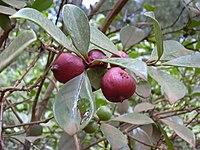
Photo from wikipedia
Abstract The purpose of this paper was to investigate the proliferative and genotoxic activity of juices from fruits of Psidium cattleianum, also known as strawberry guava, using the Allium cepa… Click to show full abstract
Abstract The purpose of this paper was to investigate the proliferative and genotoxic activity of juices from fruits of Psidium cattleianum, also known as strawberry guava, using the Allium cepa test. Fruits were collected and frozen for subsequent juice preparation at a concentration of 125 g l−1. The treatments consisted of T1: distilled water (negative control), T2: juice of yellow strawberry guava collected in Arroio Grande, T3: juice of yellow strawberry guava collected in Palma, T4: juice of red strawberry guava collected at UFSM, and T5: 1% glyphosate solution (positive control). Eight thousand cells per treatment were analysed and the mitotic indices (MI) were calculated. The juice samples were analysed by high-performance liquid chromatography (HPLC). Statistical analyses were performed using the chi-square and Tukey tests (p < 0.05). The results show irregularities in the cell division, mainly during metaphase, and an antimitotic effect in addition to an increase in the MI in treatments containing strawberry guava juice. Using HPLC, epicatechin was predominant in T2 and T4, and isoquercitrin in T3. Overall, strawberry guava has proliferative and genotoxic effects on the cell division of A. cepa, as well as an antimitotic action preventing the mitotic spindle from forming.
Journal Title: Caryologia
Year Published: 2017
Link to full text (if available)
Share on Social Media: Sign Up to like & get
recommendations!